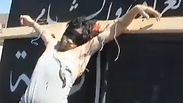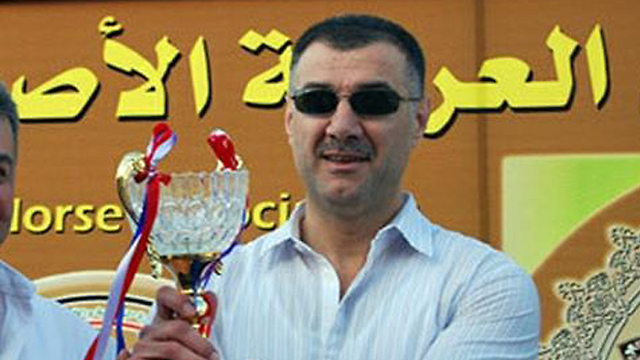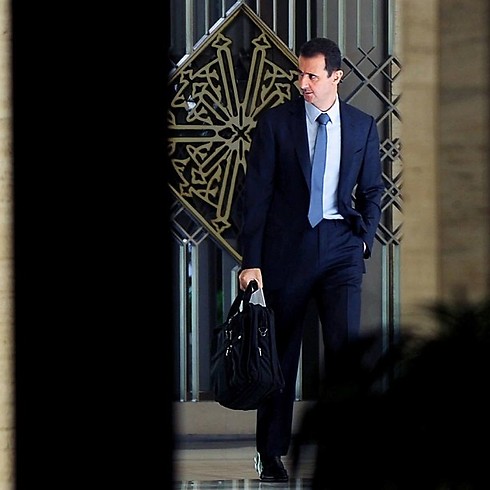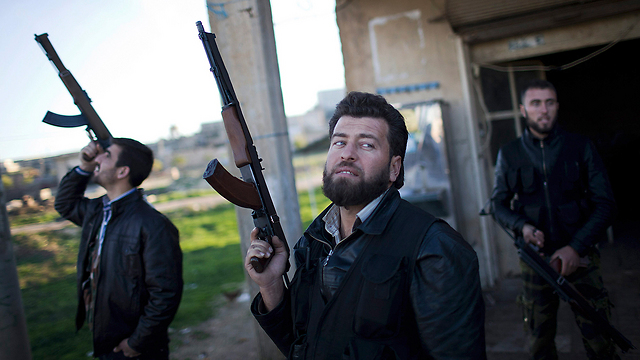
Middle Ages in Syria: Horrors in name of Islam
Analysis: Indescribable violence in Arab country, which includes decapitation and hanging bodies in squares, is not only perpetrated by Assad regime and its mercenaries, but also by radical rebels seeking to establish an Islamic caliphate.
The assassination was likely a random success, as the rebels' target was the Alawi command area in the city, but they did not know who the rockets would hit.
Anyone familiar with the Syrian regime's history will likely not rule out the possibility that it was an internal assassination of a leader who obtained too much power. The crimes of the Shabiha, which the regime refers to as "al-Difa'a al-Watani" (the national defense), include murdering suspects, invading homes, robbery, abuse, torturing suspects and kidnapping young women in order to exploit them. The biggest horrors are taking place in the militia's prisons, especially in the Mezzeh Prison in Damascus.
The Shabiha is run like a mafia for all intents and purposes under the command of Hilal's relatives. Suleiman Assad, Hilal's son, who is known as "the Latakia nightmare," drives wildly on the streets and fires in all directions, abuses citizens and takes whatever he pleases from the merchants. Even the Syrian president has ordered his arrest several times for fear that he would harm members of his ethnic group.
Rumors have been circulating in Damascus about the death of Shabiha leader Diaa Assad, the head of a gang of hooligans who use drugs and steroids to build their muscles. The hooligans, who have a Bashar Assad tattoo on their body, have a free hand to fulfill their nefarious intentions. They terrorize the streets of the cities under the regime's control, while handling suspects.
The accumulating crimes are not only committed by the Assad regime, although some countries in the Persian Gulf wouldn’t like to admit it. The Arab League's final statement last month included a one-sided condemnation which failed to mention the radical rebels.
Dark Middle Ages in northeast Syria
It's noontime in the northern Syrian city of Ar-Raqqah. Masses gather at the square by a huge black al-Qaeda flag with the Shahada (an Islamic creed which declares belief in the oneness of God) written on it and the name of the organization "The Islamic State of Iraq and the Levant" (or Daash).
The viewers are holding up their phones, ready to document the most horrifying "show" in town: Masked men seat their bound captives, one of them reads a speech about the punishment of sinners and traitors. After "Allahu Akbar" ("God is great") chants, one of the masked men carries a large sword and beheads them one by one. This is the final stop of the organization's captives after going through different kinds of indescribable torture.
This description is not taken from a horror film. It's the reality of thousands of Syrian citizens living in the northern part of the country under the Daash organization's control. The armed rebels' organization, the Free Syrian Army, which is waging an all-out war against the radical Islamist organization, managed while taking over some of its strongholds to capture some of the organization's activists and to free its own incarcerated people.
The captors' and captives' testimonies are stranger than fiction. The young bearded Islamist activists say they did not understand why they had to fight against the Free Syrian Army and kill its leaders. They say they were just following orders and believed that it was a battle for Allah.
The types of torture they used against the detainees, activists of rival opposition organizations and citizens suspected of "violating Islam laws," included drowning their heads in water, electric shocks, leaving a person naked for the sake of humiliation, starvation, giving them salt water to increase their thirst, and more. All the former detainees appeared beaten and spoke about horrors they were exposed to in captivity.
The areas controlled by Daash have turned into horror grounds which are reminiscent of dark days in the region's history: Chopped-off heads, bodies hanging in the squares and even a young man hung in a crucifixion-like pose in the center of Ar-Raqqah.
All these are descriptions that can be found mainly in writings from the Middle Ages, such as the cruelty of the Umayyad caliphs in Damascus in the seventh and eighth centuries. These caliphs did not even have mercy on Husayn ibn Ali, the grandson of Prophet Muhammad, and butchered him and his relatives in Karbala, Iraq. Husayn's chopped-off head was brought to the caliph's courtyard in Damascus.
The renewed opposition
Some of the captives say angry citizens stormed Daash's detention camps and released them. In the north, Arab and Kurd citizens organized protest rallies recently, claiming that "Daash and the regime are two sides of the same coin."
Zahran Alloush, the leader of the Salafi Islamic front, said in an interview that Daash was nothing but an Iranian-funded militia serving the Syrian regime's goals. He noted that the regime was refraining from harming Daash. Whether there is a conspiracy or not, there is no doubt that the Islamist organization is harming the rebels more than it is harming the regime, thereby assisting it indirectly.
In the past few months, the Free Syrian Army has begun recovering after reaching an unprecedented low in late 2013. Al-Qaeda's intensification led to a temporary tactical merger between the Islamic front and the Free Syrian Army. Now they are fighting side by side against the regime in the Latakia area and against Daash in other battlegrounds in the north.
After about a year of failed command, the Free Syrian Army decided to replace its commander, Salim Idris, an engineer with no experience on the ground, with a more suitable person. The new commander, Abd al-Ilah al-Bashir al-Nuaimi, like his predecessors, was among the officers who deserted the Syrian army in 2012, and he has proved his command abilities in battles in the Quneitra area. He belongs to the Bedouin al-Nuaimi tribe, one of the biggest tribes in the region.
His tribal affiliation is particularly important in light of the breakup of the political framework and the blurred borders between Lebanon, Syria and Iraq. In western Iraq, a battle is taking place between the Daash organization and the Bedouin tribes of the al-Anbar region. The Free Syrian Army's slow recovery is felt on the ground. Two weeks ago, it advanced towards Latakia and it is even approaching Qardaha, where the Assads were born. Last week, its fighters took over the Daraa prison in the south.
The Free Syrian Army's website is the only opposition website which is not adorned with fundamentalist slogans or pictures of al-Qaeda leaders. The organization's recovery may therefore be a ray of light in the darkness prevailing in Syria between Daash and the regime.
The internal crisis Turkish Prime Minister Recep Tayyip Erdogan is dealing with will possibly encourage him to play a more active role in the battle alongside the rebels in northern Syria. The shooting down of the Syrian plane which entered Turkish airspace about two weeks ago may indicate that this is his ambition. Turkey threatened several weeks ago to invade Syria if the Daash organization damaged the grave of the Ottoman Empire's founder in the Aleppo area.
Will the Free Syrian Army leaders succeed where his predecessors failed? Will Turkey intervene? Only time will tell. In the meantime, the horrors continue and the world remains silent.
Dr. Yaron Friedman, Ynet's commentator on the Arab world, is a graduate of the Sorbonne. He teaches Arabic and lectures about Islam at the Technion, at Beit Hagefen and at the Galilee Academic College. His book, "The Nusayri Alawis: An Introduction to the Religion, History and Identity of the Leading Minority in Syria," was published in 2010 by Brill-Leiden













